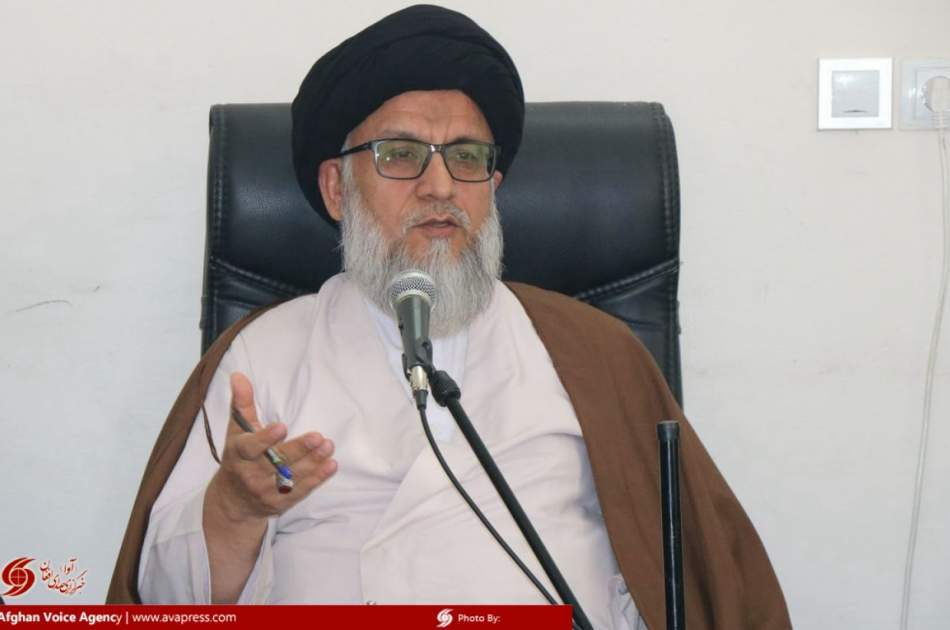Hojjat-ul-Islam wal-Muslimeen Hosseini Mazari, in a meeting with a group of officials and staff of the representative office of the Tabyan Center in the holy city of Qom, emphasized the fact that the oppressors will be tormented in this world and the hereafter, and said: "Whenever a person commits injustice, whether it is severe cases like Killing and transgressing divine limits, whether it is mild cases that are generally not considered cruelty, will be involved in its consequences in any case. Involvement with torment of conscience, debt, family disputes, hard life at the time of death, going astray, isolation, lack of progress, unrighteous generation, terrible end and destruction are among the consequences of oppression in human life if there is no repentance.
Publish dateSunday 25 December 2022 - 12:02
Story Code : 262829
Hussaini Mazari in the Tebyan Center office in Qom:
Examples and consequences of oppression in human life/ Precedence of collective interests requires securing individual interests
Afghan Voice Agency (AVA) - The holy city of Qom: Hojjat-ul-Islam wal-Muslimin Hussaini Mazari during a speech in this meeting, referring to the blessed verse " و ما كان ربك ليهلك القرى بظلم و أهلها مصلحون " said: if there is oppression in a society and on the other hand If reformed, fair and reforming elements are present in that society, Allah (SWT) will avoid destroying the house or city and tormenting those people because of their presence.
He considered injustice and justice to be opposite to each other and noted: In the general sense, justice means something being in its place, and oppression means putting something out of its place. Even though the general public mentions taking the rights of others by force or killing and beating unjustly, there are many examples of oppression and 81 examples of oppression are mentioned in the verses of the Holy Quran. This is where we are worried about our own performance, so that we do not become oppressors in our actions with this wide circle of oppression.
This expert on religious issues added: If there is a sign of oppression in our actions, 53 consequences will follow, including economic weakness, family disputes, war and drought, etc. The final stages are the consequences. Therefore, we should examine our actions to see if there are examples of oppression in them or not.
He further pointed out some examples of oppression and said: Violation of the rights of others, impiety, conservatism and disapproval of truth and denial of falsehood despite knowledge and awareness, eye-rolling, abuse of facilities, backbiting, slander, mocking others, transgression of divine limits. Betrayal of trust and discord are among the 81 examples of oppression in the Holy Qur'an.
Hussaini Mazari noted: Sometimes we commit acts that we may not consider as oppression. For example, inappropriate honking that may cause fear of a child or putting pressure on a heart patient, or wasting time and not having an output according to the office work plan, or wasting a worker's time during the hours he should be working, are considered cruelty.
The head of the Tabyan center emphasized that the oppressors will be tormented in the hereafter and in this world, and said: Whenever a person commits injustice, whether it is severe cases such as murder and transgression of divine limits, or mild cases that are not generally considered cruel, in Either way, it will be involved in its consequences. Involvement with torment of conscience, debt, family disputes, hard life at the time of death, going astray, isolation, lack of progress, unrighteous generation, terrible end and destruction are among the consequences of oppression in human life if there is no repentance.
He pointed out: We must always be careful where we stand in the field of justice and oppression and whether we are free from the signs and examples of oppression or not, we must be in accordance with our promise and agreement with Allah (SWT) and the Imam of the Time (a.j.).
Hussaini Mazari continued by evaluating the programs carried out and in the hands of the representative of the Tabyan Center in the holy city of Qom, and found the activity of this office satisfactory in general, and at the same time added: these activities are good, but according to the existing abilities and capacities, they are not satisfactory, so the colleagues should Increase the efficiency of their work and operate with the benefit of all capabilities.
At the end of his speech, the head of the Tabyan Center, in an organizational recommendation addressed to the officials and staff present in the meeting, stated: The most important spirit that empowers the groups is putting the interests of the group first, and it should be noted that if the interests of the group are secured, the interests of the individual will be secured as well.
He enumerated the necessary work in three axes in the existing conditions and said: the first axis is to focus on the task assigned by the organization or to carry out the responsibilities that are inherent to each member. The second axis is to identify, recruit and introduce staff to the office, and the third axis is activity in the virtual space, and members should submit a work report based on these three axes.
It is worth noting; at the beginning of this meeting, Hojjat-ul-Islam wal-Muslimin Sayed Noor Ahmed Mubarez, the head of Tabyan center in Qom province, gave a report and explained the programs and activities of this representation.
He considered injustice and justice to be opposite to each other and noted: In the general sense, justice means something being in its place, and oppression means putting something out of its place. Even though the general public mentions taking the rights of others by force or killing and beating unjustly, there are many examples of oppression and 81 examples of oppression are mentioned in the verses of the Holy Quran. This is where we are worried about our own performance, so that we do not become oppressors in our actions with this wide circle of oppression.
This expert on religious issues added: If there is a sign of oppression in our actions, 53 consequences will follow, including economic weakness, family disputes, war and drought, etc. The final stages are the consequences. Therefore, we should examine our actions to see if there are examples of oppression in them or not.
He further pointed out some examples of oppression and said: Violation of the rights of others, impiety, conservatism and disapproval of truth and denial of falsehood despite knowledge and awareness, eye-rolling, abuse of facilities, backbiting, slander, mocking others, transgression of divine limits. Betrayal of trust and discord are among the 81 examples of oppression in the Holy Qur'an.
Hussaini Mazari noted: Sometimes we commit acts that we may not consider as oppression. For example, inappropriate honking that may cause fear of a child or putting pressure on a heart patient, or wasting time and not having an output according to the office work plan, or wasting a worker's time during the hours he should be working, are considered cruelty.
The head of the Tabyan center emphasized that the oppressors will be tormented in the hereafter and in this world, and said: Whenever a person commits injustice, whether it is severe cases such as murder and transgression of divine limits, or mild cases that are not generally considered cruel, in Either way, it will be involved in its consequences. Involvement with torment of conscience, debt, family disputes, hard life at the time of death, going astray, isolation, lack of progress, unrighteous generation, terrible end and destruction are among the consequences of oppression in human life if there is no repentance.
He pointed out: We must always be careful where we stand in the field of justice and oppression and whether we are free from the signs and examples of oppression or not, we must be in accordance with our promise and agreement with Allah (SWT) and the Imam of the Time (a.j.).
Hussaini Mazari continued by evaluating the programs carried out and in the hands of the representative of the Tabyan Center in the holy city of Qom, and found the activity of this office satisfactory in general, and at the same time added: these activities are good, but according to the existing abilities and capacities, they are not satisfactory, so the colleagues should Increase the efficiency of their work and operate with the benefit of all capabilities.
At the end of his speech, the head of the Tabyan Center, in an organizational recommendation addressed to the officials and staff present in the meeting, stated: The most important spirit that empowers the groups is putting the interests of the group first, and it should be noted that if the interests of the group are secured, the interests of the individual will be secured as well.
He enumerated the necessary work in three axes in the existing conditions and said: the first axis is to focus on the task assigned by the organization or to carry out the responsibilities that are inherent to each member. The second axis is to identify, recruit and introduce staff to the office, and the third axis is activity in the virtual space, and members should submit a work report based on these three axes.
It is worth noting; at the beginning of this meeting, Hojjat-ul-Islam wal-Muslimin Sayed Noor Ahmed Mubarez, the head of Tabyan center in Qom province, gave a report and explained the programs and activities of this representation.
avapress.com/vdcirrar3t1aqv2.ilct.html
Tags
Top hits
4







